[Introduction]
I traveled to Nikko (日光) for three days and two nights in the middle of February for the first time in five years. Visiting Nikko in winter would be a good choice, since there are less tourists compared to other seasons (summer and autumn) and visitors are able to enjoy snow scenery. In this article, I will write about moving to Nikko and walking around Nikko station as part of Day 1.
[Visit Places (series of articles)]
* Day 1: Nikko Station [This article]
* Day 1: SL Taiju
* Day 1: Kegon Falls and Lake Chuzenji
* Day 1-2: Nikko Station (Light-up) and Nikko Station Hotel Classic
* Day 2: Shinkyo Bridge and Nikkosan Rinno-Ji Temple
* Day 2: Nikko Toshogu Shrine
* Day 2: Futarasan-Jinja Shrine, Taiyuin Nikkosan Rinno-Ji Temple and Tamozawa Imperial Villa Memorial Park
* Day 2-3: Nikko Kanaya Hotel
* Day 3: Kosugi Hoan Museum of Art and Matsuyashiki
[Travel Date]
2018.02.18-20
[Main Part]
It has been more than two weeks since I posted the previous article about Hong Kong trip and now I will start a new series. As my first trip in 2018, I traveled to Nikko (日光), Tochigi prefecture, for three days and two nights from February 18 to 20. I have relatives who live in Nikko, but I haven’t been there for five years, so I decided to visit Nikko after a long interval.
Go to Nikko from Shinjuku with “Nikko 1”
There are several options to go to Nikko from Tokyo. In my case, I used a direct express train “Nikko 1” from Shinjuku station, which is co-operated by Tobu Railway and JR East.
“Nikko 1” departs from Shinjuku station at 7:36 a.m. and the train’s red body color expresses world-heritage shrines and temples in Nikko.
There are two seat colors, orange for odd number car trains and blue for even number car trains.
I had a ekiben (a box lunch) for breakfast.
“Nikko 1” runs on JR East’s railroad from Shinjuku station to Kurihashi station and runs on Tobu Railway’s railroad from Kurihashi station to Tobu Nikko station. It takes about two hours to reach Tobu Nikko station from Shinjuku station.
I arrived at Nikko station.
There was a limited express train “Spacia” on the other side.
After passing the station ticket gate, I stopped by Tobu Nikko station tourist center. I bought a “Chuzenji Onsen Free Pass”, which I will use later.
Tobu Nikko Station and JR Nikko Station
I will walk around Nikko station. First, Tobu Nikko station.
Tobu Nikko station was opened in 1929 and renovated in the current Alpine style in 1979. The station was chosen as one of the “100 prominent stations in the Kanto region” in 2000.
Bus station near Tobu Nikko station. Several buses are available at the bus station, including “World Heritage sightseeing bus” that stops at Nikko Toshogu Shrine.
There are several souvenir shops in front of the station.
There was also JR Nikko station near Tobu Nikko station.
JR Nikko station was opened in 1890, older than Tobu Nikko station, and the current station building was built in 1912.
On the second floor, there is “White room”, a former waiting room for first-class train travelers. Now the room is opened to the public.
Although there are not any direct trains from Tokyo area to JR Nikko station, visitors are able to reach JR Nikko station by way of Utsunomiya station with Tohoku Shinkansen line. If you (foreign tourists) plan to use “JR TOKYO Wide Pass” or “JR EAST PASS”, you may consider to use JR Nikko station.
Nikko-kaido Road
Now I will walk around Nikko-kaido Road.
Nikko-kaido Road was one of the five routes of the Edo period and it was built to connect Edo (modern-day Tokyo) with Nikko Toshogu Shrine. There are a variety of cafes and traditional craft shops.
For example, “Niemon (仁右衛門)”, a cafe and gallery.
This is “Irodori Kobo (彩工房)”, a traditional craft shop of Handmade Nikko carving and Mashiko pottery.
The retro building was “Enya (えんや)”, a beer restaurant.
The Nikko Fire Station looks impressive.
This is “Nikko folk museum (日光郷土センター)” where sightseeing brochures are available and traditional craft works are exhibited.
Let’s go into the folk museum. Since the Doll’s Festival’s day (March 3) came closer, there were several exhibits related to the Doll’s Festival.
Nikko Don at Kamaya cafe du Reverbere
Now I will have a lunch. I visited “Kamaya cafe du Reverbere (かまやカフェ・デュ・レヴァベール)”.
In the restaurant.
I ordered “Nikko Don (Nikko丼)”, a signature menu of the restaurant. Here are salad and soup as a starter.
This is the main dish. Rost beef, egg and Nikko-yuba (soy-milk skin) on rice set.
Then, I moved to Shimoimaichi station to take photos of “SL Taiju”.
[Closing]
That’s it for the article about moving to Nikko and walking around Nikko station as part of Day 1 of my Nikko trip.
Tobu Nikko station and JR Nikko station look impressive respectively, so these stations themselves become photo spots. Since they are adjacent to each other, I would recommend you take photos of these stations as a first step of Nikko travel 🙂
In the next article, I will write about SL Taiju as part of Day 1.
[Map]
1 Tobu Nikko Station
2 JR Nikko Station
3 Nikko folk museum
4 Kamaya cafe du Reverbere
[Related Link]
Nikko Kinugawa Travel Guide
Tobu Railway
I would appreciate it if you could share my article via the following SNS buttons.

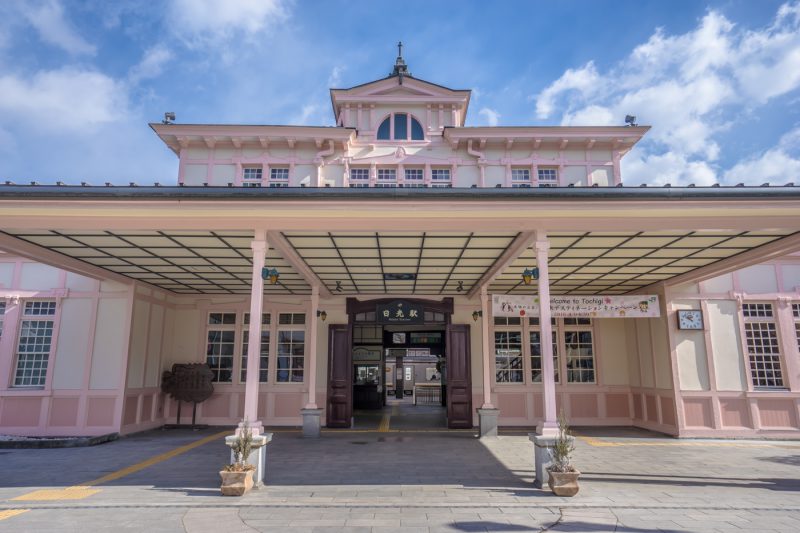
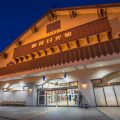
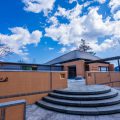
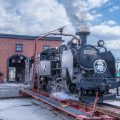
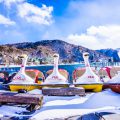
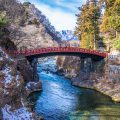
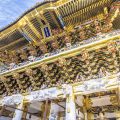
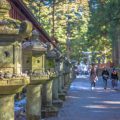
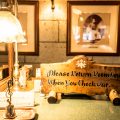
Hi! Since travelling is restricted now due to coronavirus, I am enjoying the snaps of the many beautiful sights of Japan on your blog. Thank you for uploading
Hi Stella, thank you for your comment and I am so sorry for not replying soon. The new coronavirus had had a lot of influences on our live, but I hope we will be able to enjoy traveling again soon 🙂